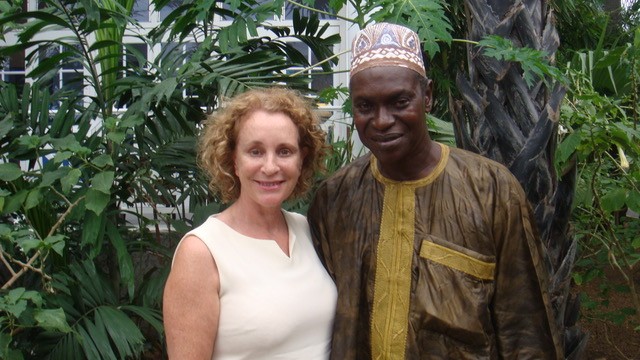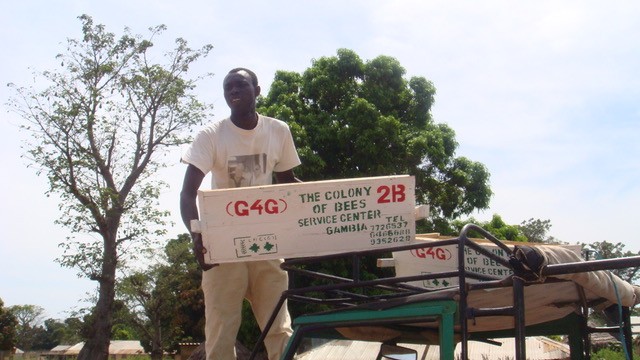
15 December 2020:
Today, with huge pride in all the work that we have done, my partner in The Gambia and I have closed our charity and NGO Gardens for the Gambia. Those of you who have followed the progress of this little charity with big effects will know how much it has meant to me.
I founded it in 1994 by accident more than design, with a gift to a small rural school of the price of digging a well in the schoolyard. Then it was £250 and I was on a research holiday, working on the background to A Respectable Trade a novel about slavery in 18th Century England. A trip out to a tiny rural school in the middle of dusty dry fields brought me to the head teacher Ismaila Sisay who asked me would I contribute to digging a well in the schoolyard. He told me that a well would be used to teach the children – mostly the children of subsistence farmers – how to irrigate for crops, and how to grow salad and food crops so that they did not have to rely on the increasingly unreliable Rainy Season. Around the garden they would plant nut trees and citrus trees and the products would be sold to provide stationary and pens for the schoolchildren who currently had to learn from rote – there were no schoolbooks or pencils.
It was such a little cost, and such a great project that I was happy to write a cheque for £250, and glad to hear from Ismaila that the well had been dug, had found water at about 15m, and they were planting the garden. He also said – (and this always makes me smile) – the next door school would like a well too!
It was such a lovely project, so simple in technology, so aligned to the needs of the people and how they could change and improve their own lives that I was glad to send another payment – and that started a process which turned, in the end, to a registered UK charity, a fund raising campaign, and an NGO in The Gambia. All the funds I raised I sent to The Gambia, and Ismaila commissioned well diggers, saw wells built, and gardens planted. Over the years we have commissioned more than 300 wells, Ismaila has visited England and I have returned several times to check on progress, and we have fed thousands of hungry children with the produce of the gardens.
Some wells stand out in my memory – the deep well we put into an urban school with a tap to serve the whole village with clean drinking water, the borehole we dug with International Rotary to service a clinic on the border of The Gambia and Senegal, and the well that we put in The Gambia’s sole agricultural college so that a generation of farmers could learn irrigated farming. And I will never forget the women’s co-operative who created a rice paddy starting with our well and brought off a crop of valuable rice. I danced with them (looking like an idiot of course) under a baobab tree to celebrate.
Of the many creations in my life, even including the novels, I think my wells in Africa have given me the most pride and pleasure. I can’t say that I planned the ending of the programme any more than I planned the beginning; but I started to think that if I could put as many wells in The Gambia as there are schools (250) and put most of the wells in rural schools then my work would be done. This year, I diverted all our funds into sending soap towels and disinfectant to the schools, and Ismaila and I agreed that the time had come to close down our project. We had an affectionate and emotional phone call and agreed to do one last well. I have made him, from my own funds a present to say thank you for years of loyalty and honesty which made the project possible, and created a triumph of collaboration between two strangers from two different cultures who were able to trust each other to improve the lives of children in the poorest peaceful country in Africa.
It’s been a truly wonderful experience. And I would leave it saying only to anyone who thinks of taking a risk and being generous – do it! If you can afford it – do it!

Gardens for The Gambia was established in 1993 to provide water for wells in the gardens of rural schools in The Gambia.
The vegetables they grow provide school dinner for the poorest children in school who would otherwise have nothing to eat all day, the surplus produce is sold and stationery and educational equipment is bought with the profit, and the children learn the basics of sustainable agriculture.
The gardens are planted rather like an English allotment. They grow all sorts of vegetables and salad vegetables. Usually the school also plants an orchard of citrus trees and walnut trees. Often pupils from the senior class of these primary schools will be made responsible for the health of their particular tree. They fence it to protect it from straying animals and they water it every day from the well.
The wells are deliverately low technology, low budget. Basically they are circular holes dug down to the water table by hired well diggers. Usually we have to go down to about 16m. When the soil is very dry then the well has to be lined with concrete pipes. To keep the children safe a small wall is built around the well, and a rope and bucket is provided. Once the well is on stream then the headmaster of the school and the school committee are responsible for its maintenance.
Each well costs an average of only £400 to dig. For this small sum a very poor school in one of the most impoverished countries in Africa is given a chance to feed the children and grow a cash crop. For some schools the experience has been transformational.
Organisation for this charity is kept to a minimum. Philippa Gregory raises the money in the UK and sends it to a Gambian headmaster, Ismaila Sisay. He receives applications from schools who need wells and arranges the digging teams. All donations are gratefully received. Smaller sums go to the maintenance of wells and the purchase of garden equipment and seeds.
Gardens for The Gambia is a registered charitable organisation in the UK. The Gambia – reg no 103/1996 The UK.
Gardens for the Gambia during the Covid-19 pandemic